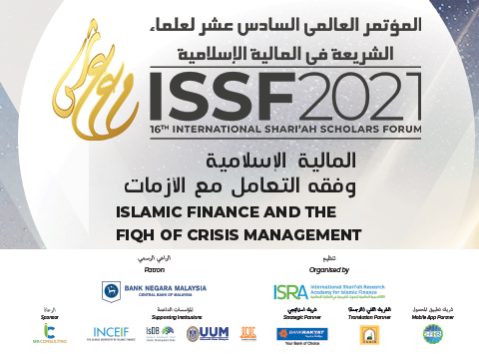Islamic Finance & The Fiqh of Crisis Management (المالية الإسلامية وفقه التعامل مع الأزمات) - Arabic
- Description
- Curriculum
- Reviews

تعقد الأكاديمية العالمية للبحوث الشرعية في المالية الإسلامية بالشراكة مع المعهد الإسلامي للبحوث والتدريب المؤتمر العالمي السادس عشر لعلماء الشريعة في المالية الإسلامية في 6-7 أكتوبر2021 الموافق لــ29 صفر و1 ربيع الأول 1443 هـــ بكوالالمبور ماليزيا، وبعنوان ” المالية الإسلامية وفقه التعامل مع الأزمات”. يروم هذا هذا المؤتمر بمميزات دراسة المبادئ الأساسية المؤسسة للتعامل مع الأزمات من خلال اعتبار الأصول والفروع الفقهية والشواهد من غير إغفالٍ للجانب المقاصدي، ودراسة أهم الضوابط الشرعية الوثيقة بها في التعامل مع الأزمات وتطبيقات المبادئ الشرعية لإيجاد الحلول لامتدادات الأزمات والجوائح في القطاعات الاقتصادية والمالية وخاصة قطاعات المالية الإسلامية الرئيسة؛ وهي المصرفية الإسلامية والشركات التكافلية وسوق رأس المال الإسلامي. واعتبارا لتطبيقات الصناعة المالية الإسلامية المتنوعة في السلطات المالية الإسلامية الرئيسة والأطر التنظيمية والقانونية النافذة؛ تمت دراسة مرتكزات فقه التنزيل وتطبيقاته في التعامل مع الأزمات في مختلف مؤسسات المالية الإسلامية بهدف توجيه ممارساتها نحو تفعيل المقاصد الشرعية وإعادة التوازن العقدي وتحقيق العدالة والإنصاف بين المتعاقدين في الصناعة مع تلبية الحاجات المتجددة المعاصرة وترشيد الابتكارات والمبادرات الطوعية لمعالجة تحديات الأزمات والجوائح الاقتصادية والاجتماعية. بالإضافة إلى مراجعة منتجات وعمليات الصناعة المالية الإسلامية والتكافل بين قطاعاتها الرئيسة في سبيل تنزيل المبادئ الشرعية على التعامل مع امتدادات الأزمة المالية من درأها أو تخفيفها مع مراعات متطلبات المنظومة القانونية والرقابية والمبادئ الإرشادية من الجهات الإشرافية والرقابية والمؤسسات الداعمة.
وسيتم خلال هذا الملقى مراجعة عمليات ومنتجات الصناعة المالية الإسلامية لإعادة التوازن العقدى وتحقيق العدالة بين المتعاقدين وإدراج تقويم الأداء الكلي لفتاوى وقرارات الهيئة الشرعية وللمنتجات والأنشطة التجارية المندرحة تحتها.
تتضمن فعاليات يومي المؤتمر سبع جلسات:
– الجلسة الأولى: المقدمات الأساسية لفقه التعامل مع الأزمات الاقتصادية والمالية في المعاملات المالية الإسلامية المعاصرة؛
– الجلسة الثانية: شواهد ونماذج من الأزمات في الفقه الإسلامي وفقه تنزيلها على الالتزامات العقدية في المصرفية والمالية الإسلامية المعاصرة؛
– الجلسة الثالثة: دور المؤسسات الداعمة والهيئات الرقابية في التعامل مع الأزمات الاقتصادية والتمويلية؛
– الجلسة الرابعة: التكامل بين القطاعات الرئيسة في الصناعة المالية الإسلامية وأثره في التعامل مع الأزمات؛
– الجلسة الخامسة: مراجعة عمليات ومنتجات الصناعة المالية الإسلامية في التعامل مع جائحة كورونا؛
– الجلسة السادسة: الحلول الشرعية للخروج من الأزمات الاقتصادية والتمويلية؛
– الجلسة السابعة حوار مفتوح بعنوان: نحو ضوابط شرعية للتعامل مع الأزمات المالية ومراجعة عمليات ومنتجات المالية الإسلامية
This online conference with certificate contains almost 8 hours recording of the International Shariah Scholars Forum 2021 provides a high-level discussion of Shariah parameters related to the crisis management and the practical implementation of relevant Shariah concepts in resolving effects of crisis and pandemic in economic and financial sectors especially in the main sectors of Islamic finance, namely Islamic banking, Takaful companies and Islamic capital market. As always, the discussions will be conducted in the spirit of appreciating diversity across key Islamic finance jurisdictions, regulatory policies and guidelines. To that end, the key principles for applying fiqh of crisis management and their applications will be examined to guide various applications of the Islamic financial institutions (IFIs) with the aim of directing the practices of IFIs towards the adherence to the spirit of Islamic law, restoration of contractual balance, the actualization of justice and fairness between the transacting parties while still meeting contemporary needs and streamlining innovations and new initiatives to address economic and social challenges of crisis and pandemic.
The objectives of this course are:
- To study deeper the basic principles governing fiqh of crisis management through the adherence to Shariah fundamentals and fiqhi issues and cases without neglecting the aspect of the spirit of Islamic law (Maqasid al-Shariah)
- To provide learners with revisiting products and operations of the Islamic financial industry and integration of its main sectors
- To discuss the application of relevant Shariah principles on managing effects of the financial crisis by eliminating or reducing them while complying with statutory and regulatory requirements as well as policy documents, guidelines and prudential guidelines from regulatory bodies and standard-setting bodies.
Facilitator:
- Sheikh Prof. Dr. Ali Muhyiddin Ali Al Qaradaghi & Sheikh Dr. Muhammad Qirat
- Sheikh Prof. Dr. Mohamed Ali Al Qari & Sheikh Dr. Abdul Bari Mashal
- Sheikh Dr. Sami Ibrahim Al-Suwaelim & Dr. Bello Lawal Danbatta
- Sheikh Dr. Muhammad Burhan Arbouna & Sheikh Assoc. Prof. Dr. Aznan Hasan
- Sheikh Assoc. Prof Dr Said Bouheraoua, Prof. Dr. Engku Rabiah Adawiyah Engku Ali & Dr Ahmad Asad Mahmud Ibrahim
- Sheikh Prof. Dr. Muhammed Ansa Zarqa & Mr. Rafe Haneef
- Sheikh Datuk Dr. Mohd Daud Bakar
- Sheikh Prof Dr Mohamed Ali Elgari
- Sheikh Prof. Dr. Ali Muhyiddin Ali Al Qaradaghi
- Sheikh Dr. Muhamad Nizam Salih Yaquby
- Sheikh Prof. Dr. Muhamad Abdul Razaq Al Tabtaba’i
- Sheikh Dr. Bashir Aliyu Umar
Target Group:
- Islamic banking and finance players & researchers
- Academia world
- Public
Course Content
- Preliminary Fundamentals of Fiqh of Economic and Financial Crisis in Modern Financial Transactions and Products
- Evidence and Cases of Crisis and Fiqh of their Implementation in Contractual Relationships in Modern Financial and Banking Transactions
- Role of Regulatory Institutions and Standards-setting Institutions in Managing Economic and Financial Crisis
- Integration of Main Sectors of the Islamic Finance Industry and its Impact on Crisis Management
- Revisiting Operations and Products of the Islamic Financial Industry and Fiqh of Crisis Management
- Shariah Solutions to Exit from Economic and Financial Crisis
- Open Dialogue: Towards Shariah Parameters for Crisis Management and Revisiting of Islamic Finance Operations and Products
- Resolution and Recommendations
Course Learning Outcomes
Upon completion of this programme, participants should be able to:
- Understand the basic principles governing fiqh of crisis management through the adherence to Shariah fundamentals and fiqhi issues and cases without neglecting the aspect of the spirit of Islamic law (Maqasid al-Shariah)
- Identify revisiting products and operations of the Islamic financial industry and integration of its main sectors\
- Apply relevant Shariah principles on managing effects of the financial crisis by eliminating or reducing them while complying with statutory and regulatory requirements as well as policy documents, guidelines and prudential guidelines from regulatory bodies and standard-setting bodies.












